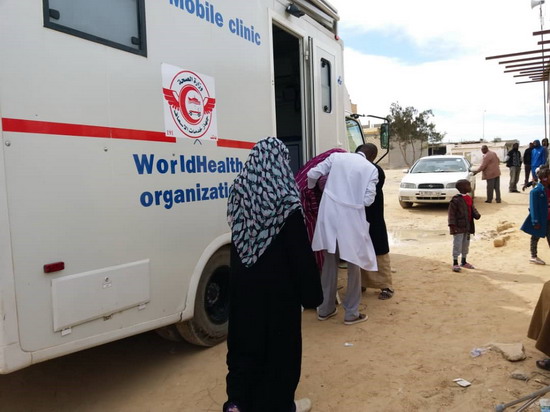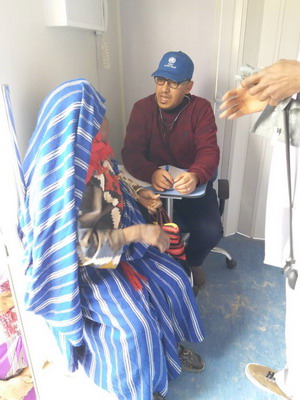
21 February, Tripoli, Libya -- With support from Office of United States Foreign Disaster Assistance, WHO established and deployed 4 emergency medical mobile teams to Benghazi, Ejdabia, Tarhouna, Tawargha and Bani-Waleid to respond to the pressing needs of displaced families, undocumented migrants and vulnerable host communities.
 Each of the teams consists of a general physician, a dermatologist, a gynaecologist, and a paediatrician. Since the launch of the EMT project in January, more than 5000 patients have been treated, mostly in camps hosting displaced populations. The teams have been established as part of WHO's broader objective of providing a basic package of health care services that covers the different elements of a Minimum Health Service Package.
Each of the teams consists of a general physician, a dermatologist, a gynaecologist, and a paediatrician. Since the launch of the EMT project in January, more than 5000 patients have been treated, mostly in camps hosting displaced populations. The teams have been established as part of WHO's broader objective of providing a basic package of health care services that covers the different elements of a Minimum Health Service Package.
WHO is also providing medical supplies and essential medicines to EMTs and referral hospitals to ensure continuity of access to health services at all levels.
“The EMTs have been trained to global-level standards, and are now equipped with the skills and supplies needed to provide urgently-needed health services to people who have very limited access to medical care,” said Dr Syed Jaffar Hussein, WHO Representative in Libya.
Due to the 8-year long political turmoil, conflict and insecurity that pushed thousands of families out of their home towns, thousands of internally displaced people (IDP) live in Benghazi, Tarhouna, Tawargh, Bani-Waleid and Ejdabia. Access of IDPs and host communities to health care services is hampered by the partial damage or full destruction of health facilities, shortage of essential medicines and inadequate health workforce.
 The spread of infectious diseases namely cutaneous leishmaniasis, tuberculosis, acute watery diarrhoea and acute respiratory infections has been widely reported from almost every municipality in Libya. Health facilities continue to face attacks that reduce already limited access to health services.
The spread of infectious diseases namely cutaneous leishmaniasis, tuberculosis, acute watery diarrhoea and acute respiratory infections has been widely reported from almost every municipality in Libya. Health facilities continue to face attacks that reduce already limited access to health services.
Related link
Office of United States Foreign Disaster Assistance


